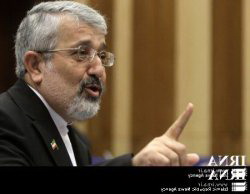ID :
219916
Tue, 12/20/2011 - 08:37
Auther :
Shortlink :
https://www.oananews.org//node/219916
The shortlink copeid
Europeans Deceived About Iran’s Nuclear Activities: Soltaniyeh

Vienna, Dec 20, IRNA – It is the European peoples' right to know the reality of Iran’s nuclear activities, the country's permanent representative to the IAEA Ali-Asghar Soltaniyeh said here Monday.
Soltaniyeh made the remarks in his speech in the European Parliament.
Iran’s ambassador to IAEA noted that the European peoples have been deceived with politically motivated, incomplete, selected information which is given to them.
“Iran has predominance over the enrichment technology and has worked under the IAEA inspectors from the beginning till now; there has been no report on Iran’s deviation from civilian activities towards military purposes,” he added.
The official underlined that sanctions, resolutions, assassination of nuclear scientists and nothing else can deprive Iran from its nuclear right, and therefore, the West, in its approach toward IRI, should replace confrontation with interaction.
"Iran has been always ready for talks based on mutual respect but using expressions like “stick and carrot” in dealing with the Iranians who have such an ancient civilization is not acceptable,” he expressed.
Soltanyieh stressed that the western countries were not loyal to their previous agreements with Tehran in several occasions including delivering fuel required for the Tehran Research Reactor (TRR), completing construction of Iran’s Bushehr Nuclear Power Plant as well as the Darkhovein Nuclear Power plant after Iran’s 1979’s revolution.
“Since the West does not have a positive record in Iran’s nuclear program, Tehran prefers to ensure the needs of its nuclear program by enriching the fuel required for its peaceful nuclear activities.
Washington and its Western allies accuse Iran of trying to develop nuclear weapons under the cover of a civilian nuclear program, while they have never presented any corroborative evidence to substantiate their allegations. Iran denies the charges and insists that its nuclear program is for peaceful purposes only.
Tehran stresses that the country has always pursued a civilian path to provide power to the growing number of Iranian population, whose fossil fuel would eventually run dry.
Despite the rules enshrined in the Non-Proliferation Treaty (NPT) entitling every member state, including Iran, to the right of uranium enrichment, Tehran is now under four rounds of UN Security Council sanctions for turning down West's calls to give up its right of uranium enrichment.
Tehran has dismissed West's demands as politically tainted and illogical, stressing those sanctions and pressures merely consolidate Iranians’ national resolve to continue the path.
Construction of the Nuclear Bushehr Plant was started in 1975 by German companies, but the work was stopped in 1979 after the Islamic revolution of Iran. A contract for finishing the plant was signed between Iran and the Russian Ministry for Atomic Energy in 1995, with Russia's Atomstroyexport named as the main contractor.
The work was delayed several years by technical and financial challenges as well as by political pressure from the West. Finally, the plant started adding electricity to the national grid on 3 September 2011and was officially opened in a ceremony on 12 September, attended by Russian Energy Minister Sergei Shmatko and head of the Rosatom Sergei Kiriyenko./end





